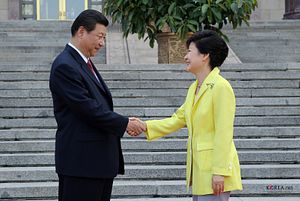Many believed Presidents Xi Jinping and Park Geun-hye would use the occasion of the former’s trip to South Korea to issue a strongly-worded condemnation of both Japan’s revisionist attitudes towards its imperial past and the Abe administration’s recent reinterpretation of the constitution. While Xi made Japan a constant talking point of his two day trip to Seoul, the two leaders’ joint statement on July 3 made no references to Japan whatsoever. Nonetheless, the complete exclusion of Japan from the conversation also sends a strong signal to Prime Minister Shinzo Abe as Presidents Park and Xi advanced talks regarding a bilateral free trade agreement (FTA).
In 2012, President Lee Myung-bak, Premier Wen Jiabao and Prime Minister Yoshihiko Noda made a joint declaration to open up talks for a trilateral FTA. Even at that time, Seoul expressed reservations about forming closer trade ties with Japan. In particular, Seoul was concerned that an FTA would cause South Korea to rely more heavily on Japanese core components and other technologies, while also chipping away at its share of China’s electronics market. This ultimately led then-President Lee to oppose a set time frame for opening up formal negotiations on a trilateral FTA. With Sino-Japanese relations frayed two years later, Lee’s strategy has worked to Seoul’s advantage, leaving President Park to forward bilateral FTA talks with the aim of penetrating the Chinese market before Japanese corporations have the same opportunity.
Many South Korean media outlets have lauded the establishment of the RQFII (Renminbi Qualified Foreign Institutional Investors), which allows direct transactions between South Korean and Chinese financial markets, as the greatest achievement of the Xi-Park meeting. Ahn Jong-beom, President Park’s chief economic adviser, emphasized the fact that this development was in the best national interest of both countries as the renminbi takes another step towards acquiring greater influence as an international reserve currency and South Korea further diversifies its basket of settlement currencies. This also sets the stage for China and South Korea to accelerate negotiations on a bilateral FTA, which is now expected to be completed by November of this year when China will host the Asia-Pacific Economic Cooperation (APEC) meeting.
South Korea’s rapid movement ahead of Japan on a bilateral FTA with China is to Tokyo’s detriment. According to the Japanese Ministry of Trade’s 2012 estimate, a trilateral FTA would increase Japan’s GDP by 0.3 percent. Nomura Securities, a Tokyo-based financial services group, forwarded an even more optimistic projection of 0.74 percent growth, exceeding even the 0.54 percent increase anticipated by Japan’s entry into the Trans-Pacific Partnership (TPP). As long as Seoul retains the upper hand on this front, the Park administration can continue to exert pressure on the Abe government, which has won its public mandate largely on promises to improve the economy.
Overall, in terms of foreign policy, the Blue House now stands at a comfortable position vis-a-vis its neighbors. However, given the public furor that preceded the ratification of the Korea-U.S. FTA, the domestic challenges to settling an agreement with Beijing might prove to be a far greater challenge.
































